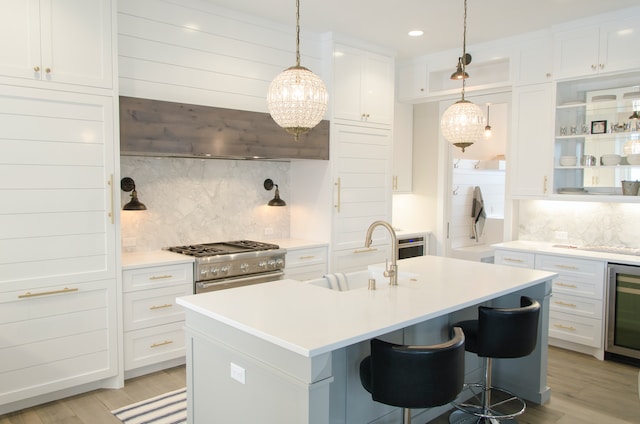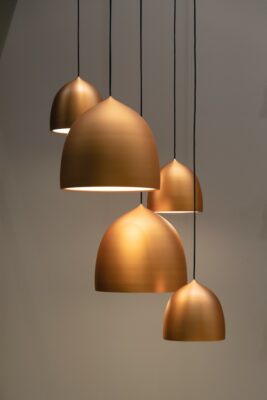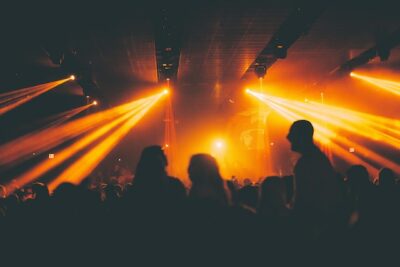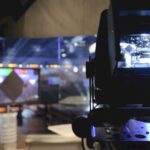
Creating the perfect ambiance is crucial for any event’s success, and lighting plays a pivotal role in achieving that. Aside from determining the type and size you need, an important question to ask is how much does lighting cost for an event?
In this post, we’ll delve into the factors that influence lighting costs for events. We’ll also provide tips and real-life examples of event costs.
Factors Affecting Event Lighting Price
The cost of event lighting can be influenced by several factors that impact the scope and complexity of the lighting setup:
1. Venue Size
The size of the event venue is one of the primary factors that affect the cost of lighting for events. Larger venues require more lighting fixtures and equipment to adequately cover the event space.
Moreover, reception spaces with high ceilings may need extra lighting elements to ensure proper illumination.
2. Type Of Lighting
The type of lighting chosen for an event also plays a significant role in determining the overall cost. Different lighting options include:
- Ambient lighting to provide general illumination
- Accent lighting to highlight specific features
- Decorative lighting to add visual appeal
The complexity and quantity of lighting features and fixtures required for each type can affect the total cost.
3. Duration Of The event
Additionally, the duration of the event directly impacts the cost of lighting.
Longer events will require lighting equipment to operate for extended periods. As a result, you may incur higher electricity consumption and additional labor costs.
4. Additional Technical Requirements
Some occasions may require additional technical elements that can increase event lighting expenses. These may include:
- Special effects, such as fog machines, gobo lights, or laser lights
- Intelligent lighting systems that offer dynamic control of the lighting setup
Equipment Rental Costs
Lighting equipment rental is a major component of event lighting costs.
Today, event organizers are fortunate to be able to choose from a wide array of lighting fixtures and accessories. As such, they can achieve their desired lighting design with from the best event lighting rental companies.
Here are some commonly used lighting equipment with their average rental prices:
1. Standard Lighting Fixtures
- Examples: PAR cans, LED uplights, and gobo projectors.
- Average Rental Price: $20 – $50 per fixture.
Standard lighting fixtures are versatile and widely used for various events. They are suitable for creating ambient lighting or adding color accents to the venue.

2. Moving Lights
- Examples: Moving head fixtures, scanners, and spotlights.
- Average Rental Price: $100 – $300 per fixture.
Moving lights offer dynamic control and can create captivating lighting effects. As a result, they’ve become popular for concerts, stage productions, and high-energy events.
3. Control Consoles
- Examples: DMX controllers and lighting software.
- Average Rental Price: $50 – $150 per unit.
Control consoles are essential for programming and operating the lighting setup. The cost varies based on the complexity and capabilities of the control system.
4. Truss And Rigging
- Examples: Aluminum truss systems for mounting lights.
- Average Rental Price: $50 – $100 per section.
Truss and rigging are essential for safely suspending lighting fixtures and creating visually appealing setups.
Labor Costs
Skilled lighting professionals and technicians play a crucial role in ensuring a seamless event lighting setup. Their expertise and experience contribute to the overall success of the event.
Here are the key roles involved and their associated costs:
1. Lighting Designer
- Responsibilities: Designing the lighting plan, collaborating with the event team, and ensuring the desired ambiance.
- Average Cost: $500 – $2,000, depending on the event’s complexity and the designer’s experience.
A skilled lighting designer understands the technical aspects of lighting. As such, they can create a unique and tailored lighting concept that aligns with the event’s theme and objectives.
2. Lighting Technicians
- Responsibilities: Installing, programming, and operating the lighting equipment during the event.
- Average Cost: $25 – $50 per hour per technician.
Lighting technicians are responsible for setting up the lighting fixtures. They also ensure that the light function properly and make real-time adjustments during the event.
3. Crew And Setup
- Responsibilities: Assisting with rigging, wiring, and positioning of lighting fixtures.
- Average Cost: $20 – $40 per hour, per crew member.
The setup crew plays a vital role in the physical labor required to install and dismantle the lighting equipment.
Additional Services And Enhancements
Beyond standard lighting equipment and labor costs, event organizers may opt for additional services and enhancements. These are helpful in elevating the lighting experience for their audience:
1. Custom Lighting Designs
Collaborating with experienced lighting designers allows event organizers to create bespoke lighting concepts. This level of customization ensures cohesion for the event’s theme and promotes the desired ambiance.
The cost of custom lighting designs can vary widely based on the complexity and creativity involved.
2. Special Effects
Special effects can add a touch of drama and excitement to an event. These include:
- Fog machines
- Laser lights
- Pyrotechnics
However, these effects come at an additional cost. Moreover, their usage should be carefully planned to avoid exceeding the budget.
3. Power Distribution
For larger lighting setups or outdoor events, organizers may need additional generators and power distribution systems to ensure stable power. The cost of power distribution can range from $500 to $1,500, depending on the power requirements.
Case Studies/Examples
To gain a better understanding of how lighting costs can vary for different events, let’s explore some real-world examples:
Example 1: Wedding Reception
Wedding Venue Size: Medium
Type of Lighting: Ambient and decorative lighting
Duration: 6 hours
Equipment Rental: Standard Lighting Fixtures – 20 units, Moving Lights – 4 units
Labor: Lighting Designer, Lighting Technicians – 2
Total Wedding Lighting Cost: $2,500
In this example, the lighting setup for a medium-sized wedding reception includes:
- Standard fixtures for general illumination
- Moving lights to add dynamic effects during special moments
For a flawless setup and operation, you should hire a lighting designer and two technicians.

Example 2: Music Concert
Concert Venue Size: Large
Type of Lighting: Concert lighting with special effects
Duration: 4 hours
Equipment Rental: Moving Lights – 12 units, Control Consoles – 2, Truss and Rigging – 4 sections
Labor: Lighting Designer, Lighting Technicians – 4, Crew – 6
Total Concert Lighting Cost: $8,000
For this large music concert, the lighting setup involves extensive use of moving lights. As such, multiple consoles control the lights to synchronize with the music.
Plus, creating an even more visually impressive lighting configuration entails additional truss and rigging. To ensure the smooth operation and coordination of the setup, the team consists of:
- Four lighting technicians
- A lighting designer
- A crew of six
Tips For Cost Optimization
While event organizers strive to create a captivating lighting setup, it is essential to do so within the allocated budget. Here are some practical tips for optimizing event lighting charges without compromising on quality:
1. Plan Ahead
Start planning the lighting requirements early in the event planning process. This allows for better negotiation with lighting suppliers and ensures that the desired equipment and services are available.
2. Opt For LED lighting
LED lighting fixtures are energy-efficient and cost-effective in the long run. They consume less electricity and have a longer lifespan. As a result, you can reduce both operating costs and the need for frequent replacements.
3. Limit Special Effects
Special effects can be impressive, but they come with additional costs. Consider using them selectively to create impactful moments without unnecessary extravagance.
4. Bundle Services
When negotiating with lighting providers, consider bundling multiple services together for potential discounts. Many suppliers offer package deals that include equipment rental, labor, and additional services.
Conclusion
The cost of lighting for an event is a crucial aspect that event organizers must consider during planning.
Understanding the factors that influence lighting costs allows organizers to make informed decisions. Additionally, it enables them to allocate their event lighting budget effectively.
Being aware of additional costs ensures that the event lighting meets expectations without overspending. Optimizing lighting costs lets you create an enchanting atmosphere that captivates attendees.
As a result, you can make the event an unforgettable experience for everyone involved. Remember, the right lighting sets the stage for a truly remarkable event.




